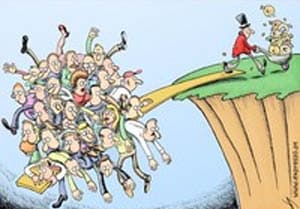
Eight years after the great recession supposedly ended, global inequality continues to deepen, exposing claims that “wealth trickles down” and “a rising tide raises all boats” as class-based lies.
New reports show that deep class divides exist not only between rich and poor countries, but within the richest countries.
A recent report from the Institute of Policy Studies shows that three men — Microsoft co-founder Bill Gates, Amazon founder Jeff Bezos, and Berkshire Hathaway CEO Warren Buffett — are together wealthier than the 160 million poorest people in the United States, half of the country’s population. Twenty-five U.S. billionaires own more than 178 million Americans.
The new edition of the Global Wealth Report, produced annually by global banking giant Credit Suisse, says that “In the past 12 months, total global wealth grew by 6.4 percent. It is the fastest pace of wealth creation since 2012 and one of the best results since the financial crisis.” But the growth is not being shared: the super-rich — one percent of the global population — now own 50% of the world’s wealth. In the bank’s words, “global wealth inequality has certainly been high and rising” since the great recession.
And a report published today by the Organisation for Economic Co-operation and Development (OECD) goes beyond monetary measures to show deep “well-being divisions” within the 35 richest countries.
The How’s Life? 2017 report shows that the richest societies are divided by education:
- Men aged 25 who did not attain upper secondary education live nearly eight years less on average than university educated males. The gap is nearly five years for women.
- The poorly educated only have half the wealth and earnings of the well-educated; are less likely to vote; to have someone to count on for help when needed; or to feel satisfied with their lives.
And by income and wealth:
- 10 percent of households in OECD countries own 52 percent of all household wealth.
- More than one in three people in 25 OECD countries surveyed are only three months’ income away from falling into poverty.
- The voter turnout rates among people in the top 20 percent income bracket is 14 percentage points higher than that of those in the lowest 20 percent bracket.
And by age:
- Despite having higher rates of educational attainment than the generations before them. people under 25 are 60 percent more likely to be unemployed than the 25-54 age group.
- The under 25s are also 20 percent less likely to vote than those aged over 55.
- But middle-aged workers are almost twice as likely as those under 25 to work very long hours (50 or more per week).
And by place of birth:
- The median income of migrant households is 25 percent lower on average than that of the native born.
- Migrants are less likely to report good health, to say they have someone to count on when in need, and to be satisfied with their lives than the native-born.
- Migrants are more likely to live in inadequate housing, to work anti-social hours and to feel depressed.
The OECD says only 38 percent of people say they have confidence in their government, a drop of four percentage points since around 2006. Only one in three people feel they have an influence over what their government does.
I’m reminded of a passage in Michael Yates’s excellent book The Great Inequality, “Under our current political economic system, none of our major problems can be solved. Insecurity, inequality, and environmental destruction will get worse unless we take radical actions, repeatedly, for as long as necessary. … Other slogans will supplement ‘We are the 99 percent,’ but I hope that the idea that ‘We are the many, they are the few’ remains foremost in our minds as we combat our class enemies.”



Hi, Ian.
When I was in university (some many decades ago) doing a degree in journalism, this would have been referred to as a ‘dog bites man story’. Sadly.
In Ireland, over the weekend, the Taoiseach (equivalent of prime minister) and minister for ‘housing’ both made statements that homeless in Ireland (which is quite high) is less than other countries. On Monday, the cheif of the government led housing agency, stated that homelessness was ‘natural and normal’ (surprising he did not add ‘within capitalist, or hyper-capitalist countries’), and yesterday another government minister said that homeless people were to blame for being homeless.
Mind you, also over the weekend, the finance minister stated that Ireland would have full employment (meaning only 5% of people are NOT employed). However, the same day, the social ‘protection’ (wich really means ‘wealth protection’) minister said that legislation would be introduced (NOT enacted, but introduced) to outlaw ‘zero-hour contracts’ in Ireland.
What planet are these people living on? Planet wealth and destroying the ecosphere.
Keep up the great work, Ian, I need these postings to keep myself sane!
brian